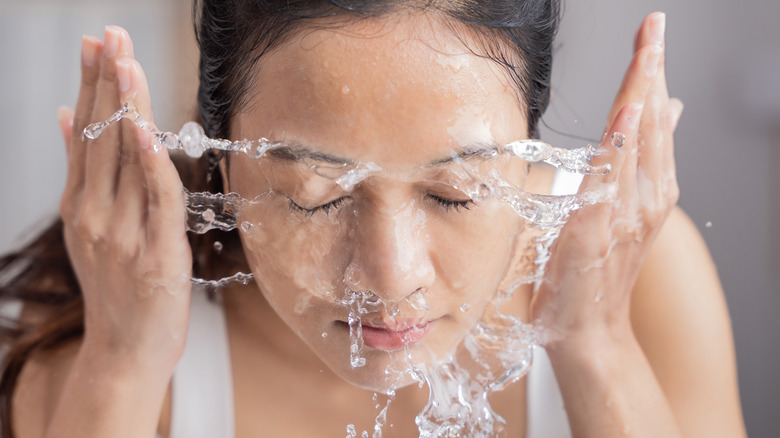Salt Water Face Wash: The Pros and Cons Unveiled
In the vast realm of skincare, where trends and routines come and go like ocean tides, one practice has stood the test of time: washing your face with salt water. This age-old beauty ritual has intrigued and fascinated many, promising a host of benefits for your skin. But does it live up to the hype, or is it just another skincare myth?
In this comprehensive exploration, we dive into the depths of beauty with the guidance of Dr. Sandra Lee, a respected dermatologist renowned for her expertise in skincare. Together, we’ll uncover the pros and cons of washing your face with salt water, examine its effects on different skin types, and provide you with practical tips to make the most of this natural remedy.
Dr. Sandra Lee: Your Skincare Mentor
Before we embark on our journey to discover the secrets of salt water face cleansing, let’s meet the expert who will be our guiding star. Dr. Sandra Lee is a board-certified dermatologist with a thriving practice and a passion for helping people achieve healthy, beautiful skin. With a wealth of experience in treating various skin conditions, she’s the perfect mentor to navigate the intricacies of skincare.

The Pros of Saltwater Face Cleansing
1. Acne and Blemish Control
One of the primary reasons people turn to salt water face cleansing is its natural antibacterial properties. Salt can help combat acne-causing bacteria and reduce breakouts. It acts as an exfoliant, helping to unclog pores and remove dead skin cells, which can lead to clearer, more radiant skin.
2. Skin Hydration and Detoxification
Salt water is known for its hydrating properties. When used in moderation, it can help your skin retain moisture, giving you a healthy, dewy complexion. Additionally, salt is renowned for its detoxifying abilities, helping to draw out impurities and toxins from the skin, leaving it refreshed and revitalized.
3. Eczema Relief
For individuals with eczema-prone skin, saltwater face cleansing can offer soothing effects. The minerals in salt, such as magnesium and potassium, can help alleviate itching and inflammation associated with eczema. However, it’s essential to consult with a dermatologist like Dr. Sandra Lee before incorporating salt water into your routine, as eczema varies in severity.
The Cons of Saltwater Face Cleansing
1. Potential Dryness and Irritation
While saltwater can be beneficial, it’s important to use it with caution. Excessive use or using a highly concentrated salt solution can strip your skin of its natural oils, leading to dryness, redness, and irritation. Over time, this may weaken your skin’s barrier and exacerbate skin issues.
2. Proper Dilution is Crucial
Getting the right balance is key to successful salt water face cleansing. Using saltwater that’s too salty can be harsh on the skin, while a solution that’s too diluted may not provide the desired benefits. Finding the sweet spot requires some experimentation and careful observation of your skin’s response.
DIY Saltwater Face Cleansing: Tips and Tricks
For those intrigued by the idea of incorporating saltwater into their skincare routine, here are some valuable tips and tricks to get you started:
1. Choose the Right Salt: Opt for high-quality sea salt or Himalayan salt. These varieties are less processed and contain essential minerals that can benefit your skin.
2. Create a Balanced Solution: Mix the salt with warm water to create a gentle solution. Start with a small amount of salt and adjust the concentration based on your skin’s response. A general guideline is one teaspoon of salt per cup of water.
3. Perform a Patch Test: Before applying salt water to your entire face, perform a patch test on a small, inconspicuous area of your skin. This will help you determine if your skin is sensitive to the solution.
4. Limit Frequency: It’s essential not to overdo it. Incorporate salt water face cleansing into your routine no more than two to three times a week to avoid potential dryness and irritation.
5. Moisturize Afterward: Follow up with a moisturizer to lock in hydration and keep your skin barrier intact. A lightweight, non-comedogenic moisturizer is an excellent choice.
Balancing Act: Is Saltwater Right for You?
Determining whether saltwater face cleansing is suitable for your skin type and concerns is crucial. Dr. Sandra Lee emphasizes the importance of personalized skincare evaluation. Here are some factors to consider:
1. Skin Sensitivity: If you have highly sensitive skin, rosacea, or a compromised skin barrier, salt water may not be the best choice. It’s always wise to consult with a dermatologist to assess your individual needs.
2. Pre-Existing Skin Conditions: If you have pre-existing skin conditions like psoriasis, eczema, or dermatitis, salt water can either help or exacerbate your symptoms. Seek professional guidance to avoid potential flare-ups.
3. Skin Goals: Your skincare goals should also influence your decision. If your primary concern is acne control or detoxification, salt water may be worth exploring. However, if your skin is already well-balanced, you may not need it.
Conclusion: Navigating the Seas of Skincare
As we conclude our voyage into the world of saltwater face cleansing, we reflect on the insights Dr. Sandra Lee has shared. Saltwater can be a powerful addition to your skincare routine if used wisely. With the right knowledge and guidance, you can harness the beauty benefits of the sea while avoiding the potential pitfalls.
Remember that skincare is a personal journey. What works for one person may not work for another. The key is to approach your skincare routine with care, attention, and a willingness to adapt based on your skin’s needs.
So, as you consider diving into the allure of saltwater face cleansing, remember the words of wisdom from Dr. Sandra Lee: “Your skin deserves the best, and that begins with understanding what it truly needs.”




